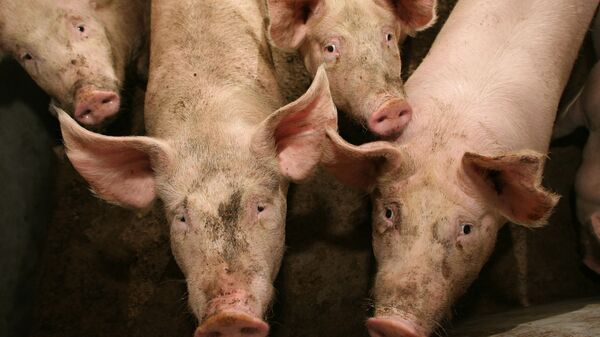The swine flu pandemic, which claimed over 18,000 lives worldwide, remains a threat for Russia, but experts believe that Russia's response to the deadly virus was effective.
Friday marks a year since the World Health Organization declared a swine flu pandemic with over 28,000 laboratory confirmed cases of the A/H1N1 strain in 74 countries. At that moment, the virus claimed the lives of 114 people.
RUSSIAN RESPONSE TO SWINE FLU
Russia has been among more than 214 countries and overseas territories or communities, which have reported laboratory confirmed cases of pandemic influenza H1N1 on their territory, including over 18,138 deaths.
A total of 6 million Russians have been affected by the pandemic during the 2009 flu season of October-December.
The Russian president instructed to create an intergovernmental commission to prevent A/H1N1-infected people from entering the Russian territory. Over 4 billion rubles ($128 million) have been allocated to produce four types of vaccines against the deadly virus.
"The human life is priceless and if those expenditures saved the lives of at least several people then I think they were justified," said Igor Nikanorov, a senior researcher at the vaccine testing laboratory of the Russian flu institute.
He said that no complete data on swine flu virus deaths in Russia is available so far, but at least 30 people died of the virus in Russia's second largest city of St. Petersburg.
The head of Russia's pulmonology institute Alexander Chuchalin said Russia was among the countries with the highest risk of possible complications.
"A certain part of the population, for example, people with excessive weight and pregnant women, acquired an aggressive viral infection which led to very serious complications, which we call a respiratory distress syndrome, or simply lung shock," he said.
He added that Russian scientists developed and launched Ingavirin, a new antiviral medicine to tackle the flu pandemic.
"It was proved that the Russian medicine is much more effective than the WHO-recommended Tamiflu and Relenza," he said.
The pandemic also illustrated problems of Russian healthcare, such as low qualification of medical staff. Despite additional intensive therapy equipment bought for many hospitals, doctors were not ready to treat patients with severe flu, Chuchalin said.
PANDEMIC STILL A TREAT
The Russian sanitary watchdog Rospotrebnadzor said in its report on the results of the A/H1N1 pandemic that flu infection rates significantly declined worldwide in early 2010.
However, WHO Director-General Margaret Chan announced on June 3 that it was too early to abolish the worldwide pandemic alert.
An emergency commission on A/H1N1 flu pandemic will convene in mid-July to discuss the reports on situation during the winter months of the southern hemisphere.
AUTUMN FORECASTS
Rospotrebnadzor said that based on the results of the 2009-2010 flu season, almost 80% of all registered flu cases were caused by the A/H1N1 virus.
"Analysis of 20th century flu pandemics show that the emerging flu viruses circulate in the human population from 10 to 40 years. Since April 2009, the new A/H1N1 virus became widespread in the human population," the Russian sanitary watchdog said in a report.
Due to this fact, the WHO recommended to include the vaccine against the A/H1N1 strain into combined seasonal vaccine for the 2010-2011 flu season.
Russia's chief doctor Gennady Onishchenko earlier told RIA Novosti that Russians will be vaccinated with a medicine to include three components, including a vaccine against swine flu.
MOSCOW, June 11 (RIA Novosti)



